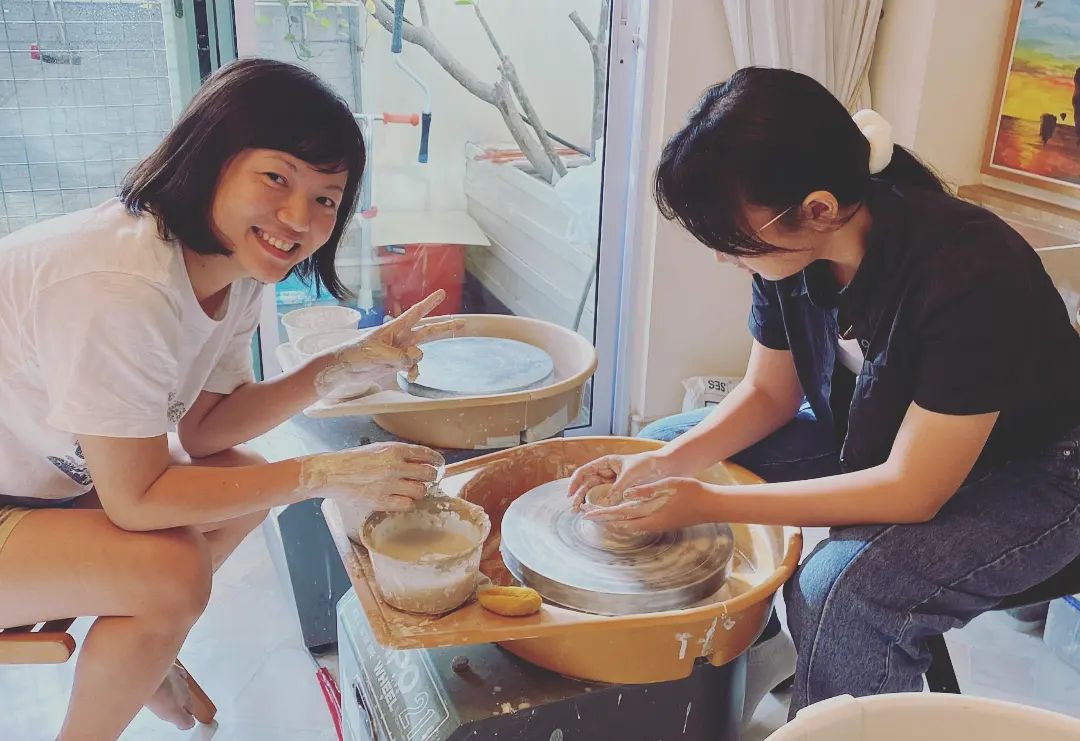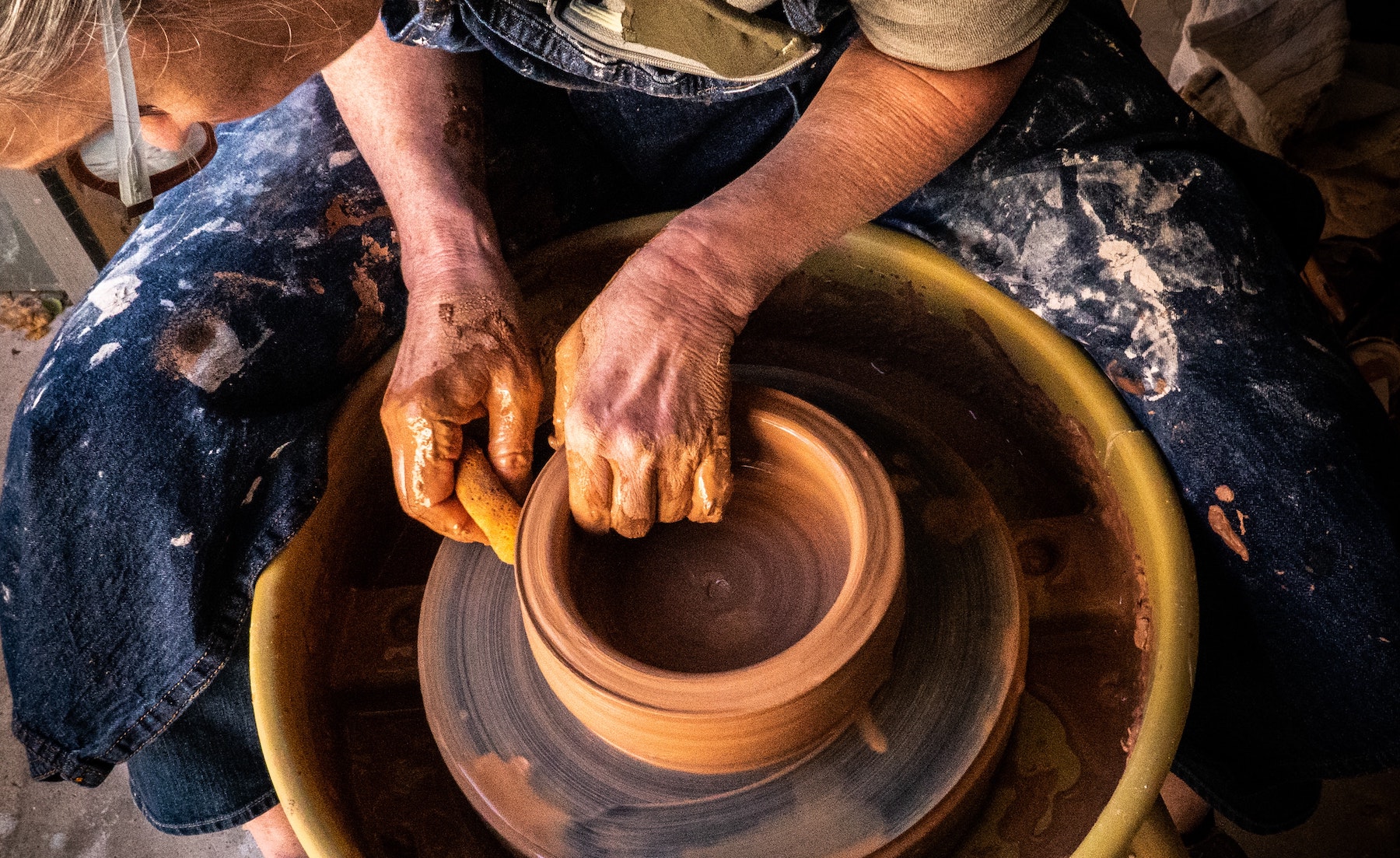When the Potter turns worthless clay into a vessel fit for treasure
Kenneth Lau // December 1, 2019, 7:00 am
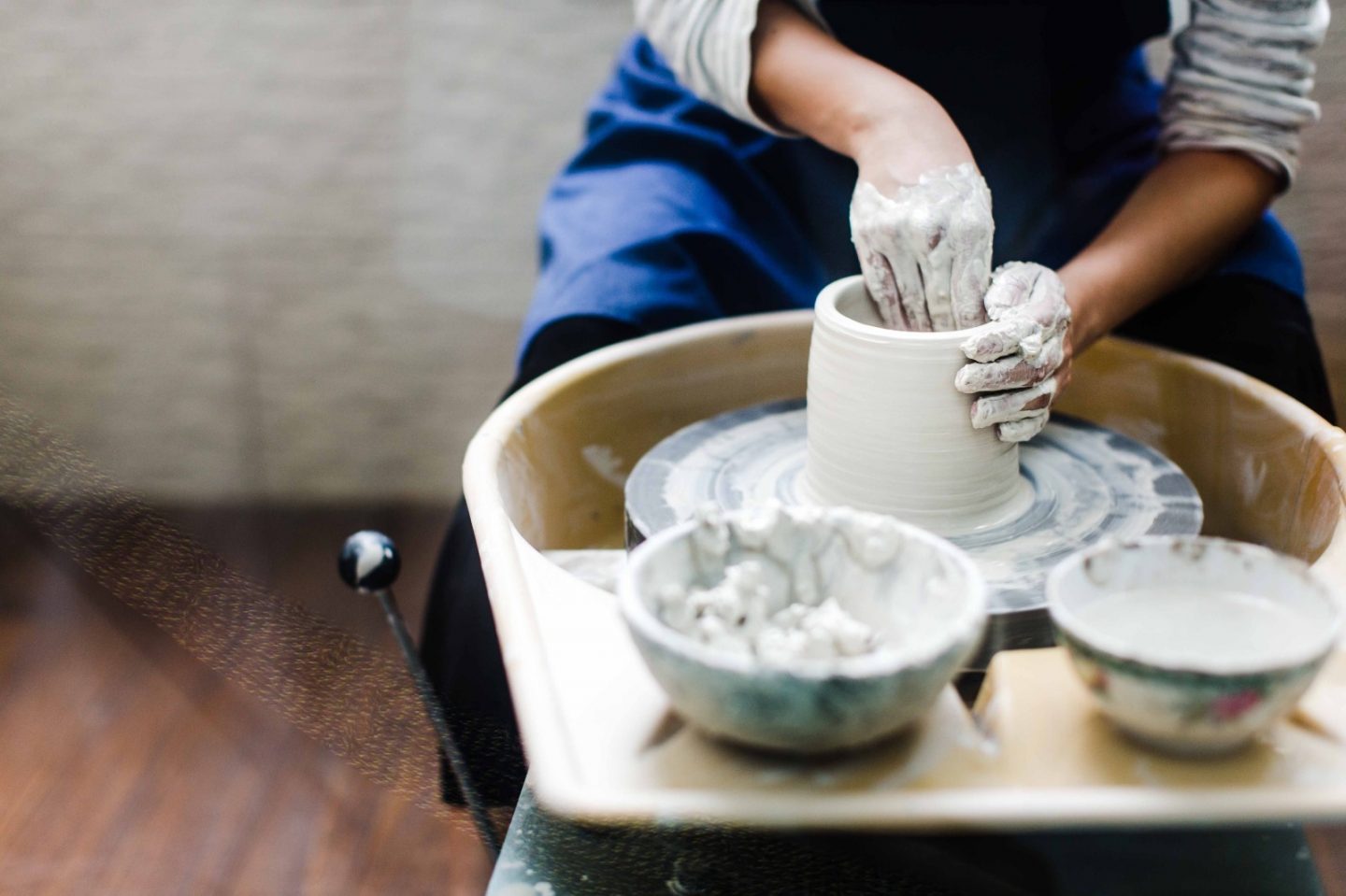
Just as God formed mankind out of dust from the ground, so were our mighty civilisations formed out of this same humble, yet profound, dust. All photos courtesy of Studio Asobi unless otherwise stated.
To a potter, clay is a marvellous thing. Holding a lump of clay in my hand, I see a myriad of minerals – feldspars, silica, alumina, iron oxide. I notice its texture, plasticity and hue. I imagine, with a rush of quiet excitement, the vessel that it would eventually become in my hands.
For most of my childhood and early adult life, before stepping into this world of pottery, clay was to me nothing more than a useless annoyance. It was mud that stained my shoes. It was the hiding place of slimy things with no legs or too many legs.
It was what stood between the Singaporean infantry soldier and his yet-to-be-completed shell scrape where he would be sleeping in throughout his mission. It is too waterlogged for many plants, too soft to support tall buildings and certainly not the choice of the wise man, who preferred to build his house upon a rock (Matthew 7:24)!
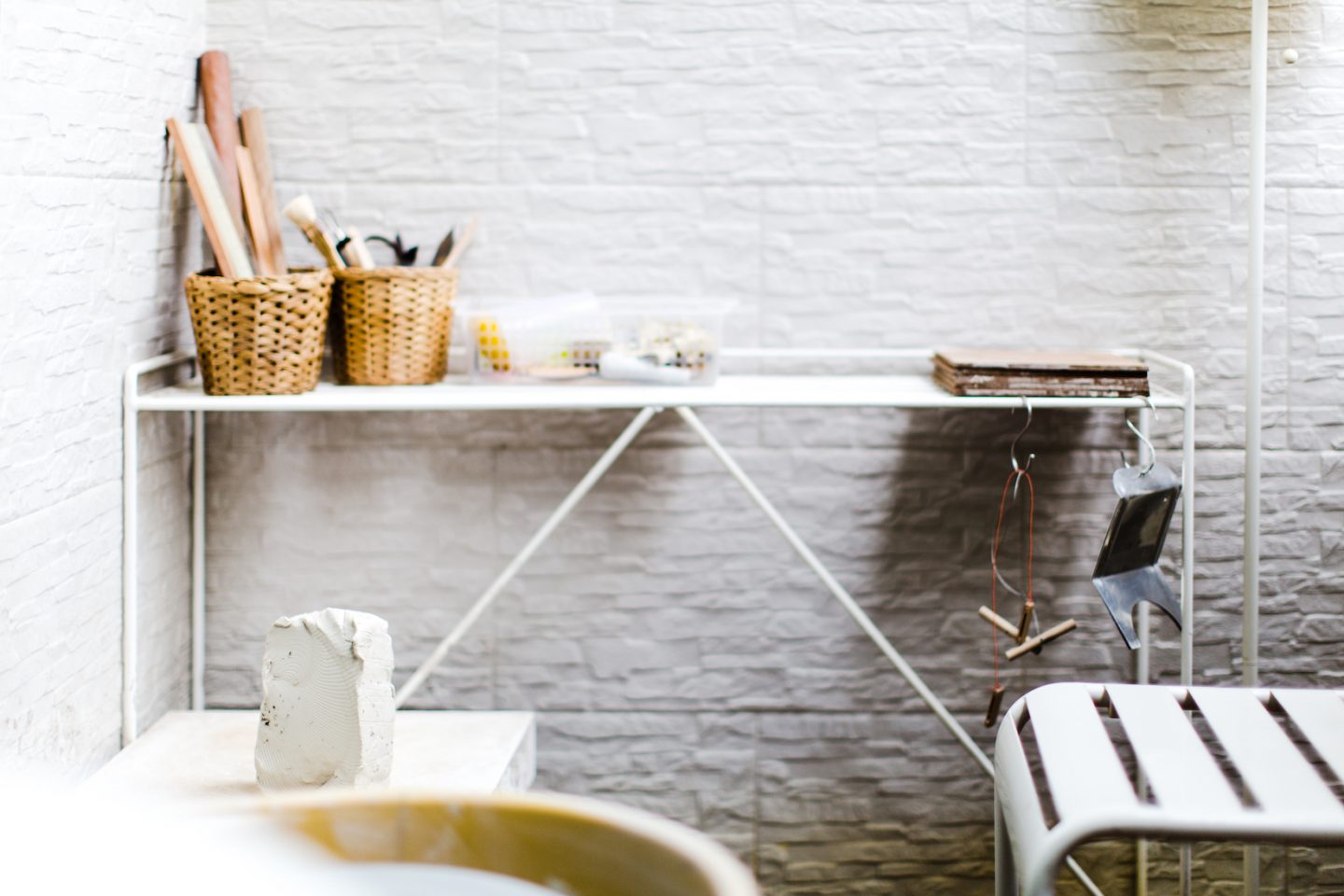
A lump of clay awaits to be fashioned into a vessel. That which is too waterlogged for many plants, too sort to support tall buildings can be made into spectacular artefacts.
Yet this seemingly worthless material is what gave rise to the millions of spectacular artefacts standing solemnly in museums all over the world, bearing silent witness to ancient cultures and forgotten civilisations.
The clay cylinders of Nabonidus, created around 550 B.C. and finally unearthed more than two millennia later in 1854, vindicated Daniel’s account of King Belshazzar who was long thought to have been a figment of imagination. This ancient art of pottery has taken a humble raw material and created from it priceless objects that defy the hands of time and open a window into mankind’s tumultuous history.
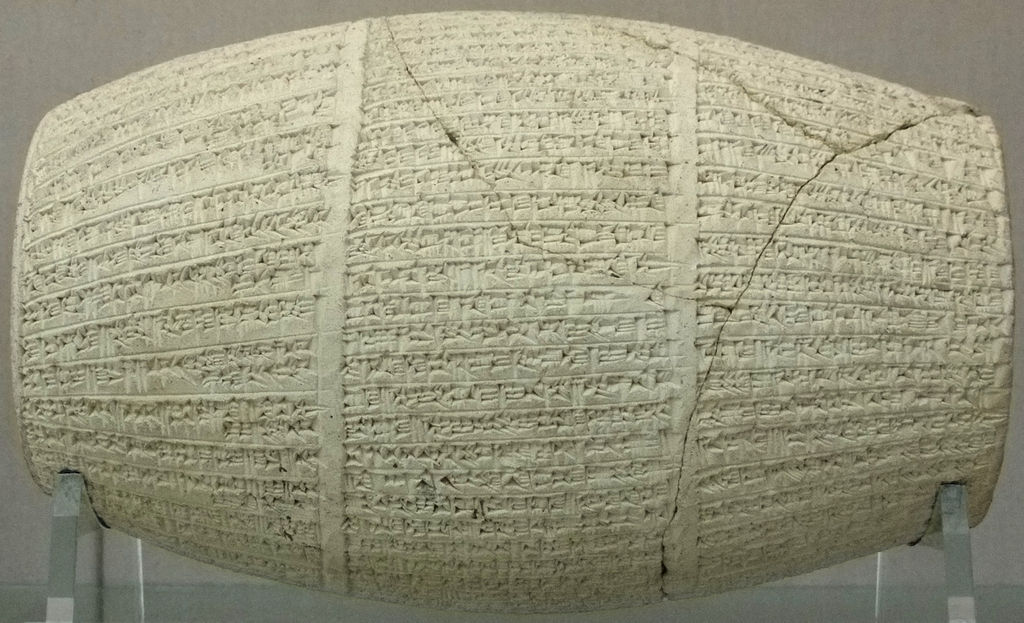
The inscription on the clay cylinders of Nabonidus makes a reference to King Belshazzar, who was mentioned in the Book of Daniel. Photo courtesy of British Museum.
In fact, the discovery of pottery could even be said to have helped give birth to civilisations – when the earliest peoples learnt how to store water and grain effectively in ceramic jars, they also ceased their nomadic existence and settled into agricultural communities near the great rivers of the world.
Just as God formed mankind out of dust from the ground, so were our mighty civilisations formed out of this same humble, yet profound, dust.
“Then the Lord God formed man of dust from the ground, and breathed into his nostrils the breath of life; and man became a living being.” Genesis 2:7
The thing moulded
“…Who are you, O man, who answers back to God? The thing moulded will not say to the moulder, “Why did you make me like this,” will it? Or does not the potter have a right over the clay, to make from the same lump one vessel for honourable use and another for common use?” Romans 9:20-21
This lump of clay now sits shapelessly on my wheel, while I bend over it, silently contemplating the form that for the moment is still invisible. The wheel starts turning and I squeeze a sponge gently over the lump, drenching it in cool water before my hands close over it. I feel its unevenness resisting my hands but as the water soaks in, it gradually softens until it is finally centred on the wheel.
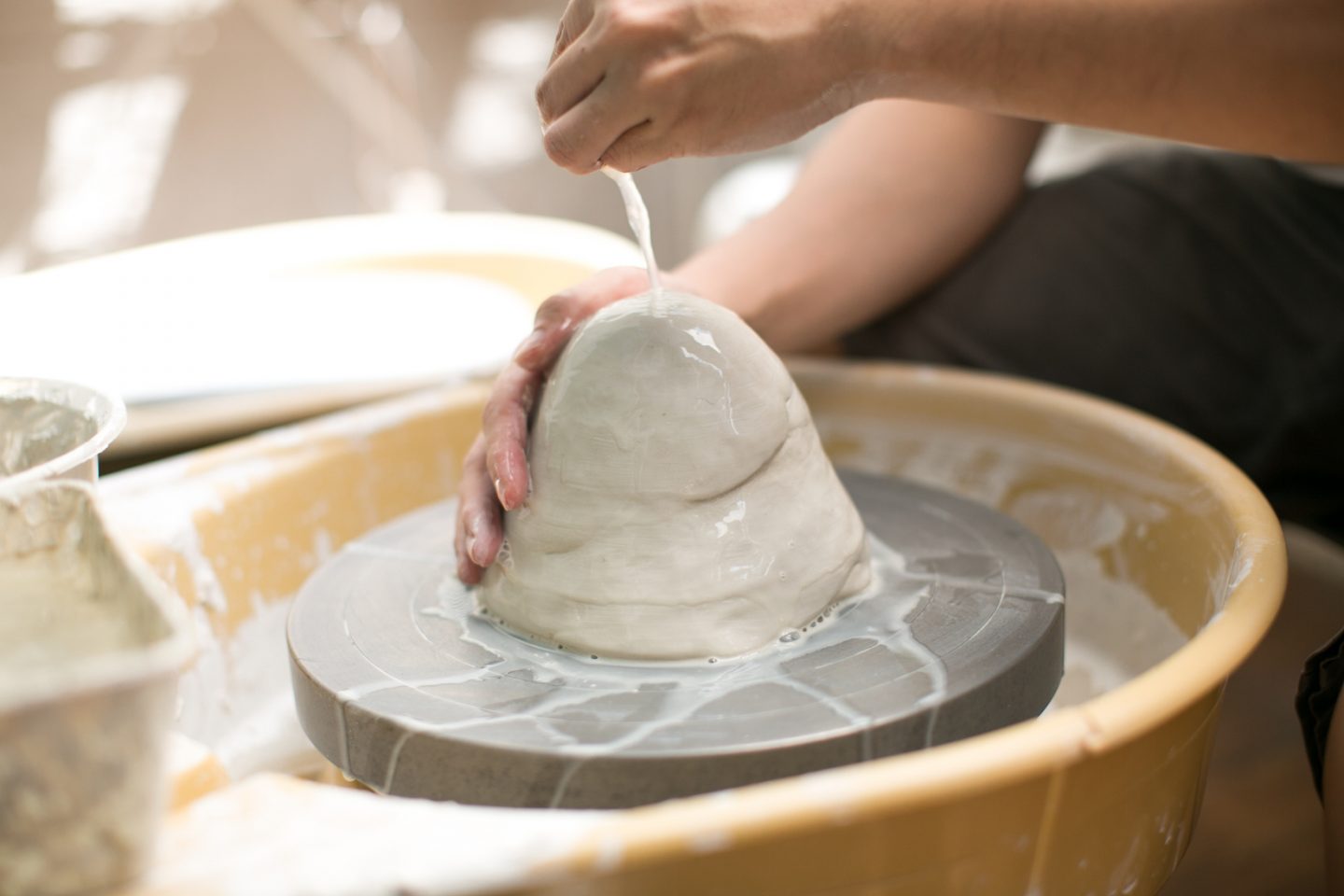
As the wheel starts turning, the potter drenches the lump of clay in cool water.
Centring, the foundational skill for any potter, is also one of the hardest to master. It requires the potter to overcome the irregularities of the clay with both firmness and fine control, paying close attention to the spinning clay without submitting to its rhythm.
Poor centring, due to lack of skill or concentration, creates instabilities in the form that only amplify as the piece is shaped, and so a potter’s emotional state is just as important as skill and experience. Each time I labour to help my clay find its centre, I am invariably faced with the question, “Where is my centre?” For if my life revolves around a wavering centre that fails to hold, it is liable to fall apart in times of trial.
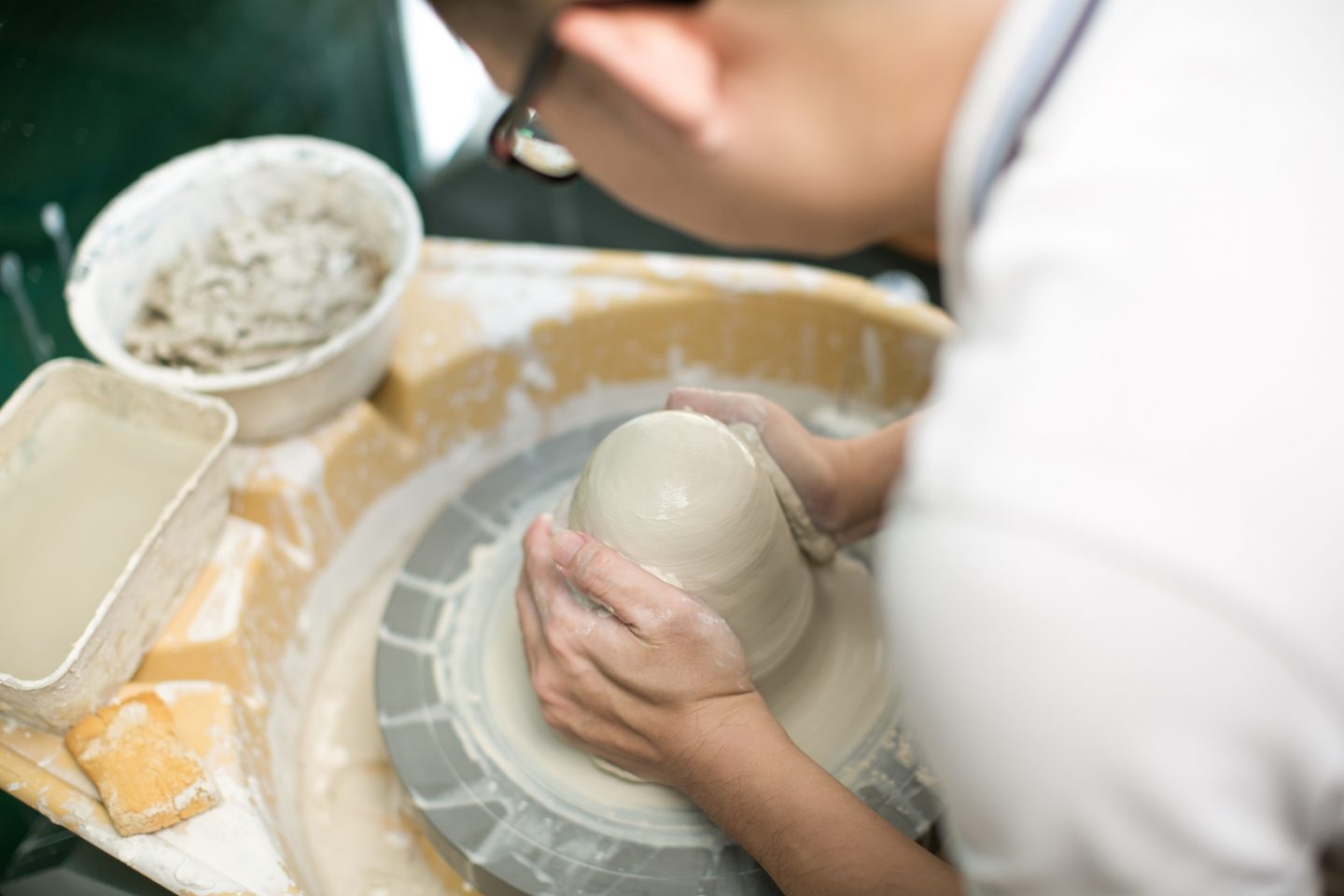
Centring requires the potter to overcome the irregularities of the clay with both firmness and fine control.
Now I press my left hand into the clay and with my right hand I counter the outward force of my left, slowly but surely lifting up the walls of the vessel. I slow my breathing, maintaining the stability of my fingers and applying a consistent pressure to the clay as I watch it rise and take shape.
The thick walls of this budding vessel are filled with promise and potential.
It is an amazing feeling, the thick walls of this budding vessel filled with promise and potential, even if it is just a stunted cylinder at this stage – just like a child filling his father’s heart with joy at his first tentative steps.
Slowly, the vessel evolves. A straight cylinder, growing taller. Then slowly ballooning in width as it loses height. Then a narrowing neck, and a gently flaring rim. Hours later, it is stiff enough to be turned upside down for its base to be trimmed, but still soft enough for a long handle to be fused in. Satisfied with the form of this water jar, I leave it out to complete its drying.
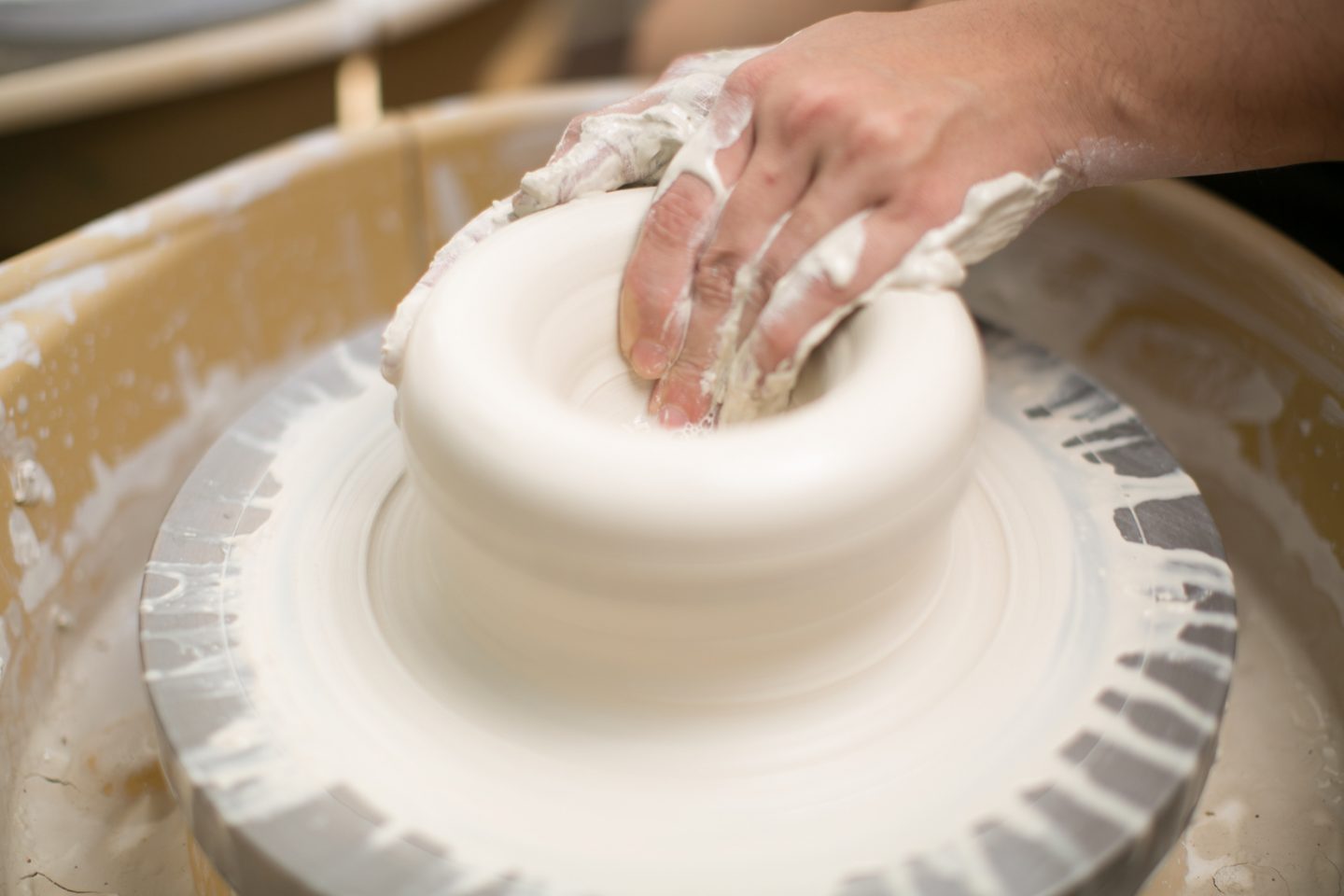
Only the potter knows when he is stopping, when the form is complete.
Until this point, the vessel has undergone many drastic changes in form. It could have been a functional vessel if I had stopped at any stage, but only the potter knows when he is stopping, when the form is complete.
As God’s handmade clay vessel, I often find myself crying out to Him: “I’m happy like this, don’t change me!” or “Why this shape? I don’t like it.” Yet God quietly continues His moulding and, sometimes, if I am attentive, I get to look back and understand why He has shaped me in a certain way thus far, even as I continue to be transformed. I may have my own ideas of what I ought to be but while I am still on this Earth, God is not done with me yet.
Does our Potter make mistakes?
“Then I went down to the potter’s house, and there he was, making something on the wheel. But the vessel that he was making of clay was spoiled in the hand of the potter; so he remade it into another vessel, as it pleased the potter to make.” Jeremiah 18:3-4
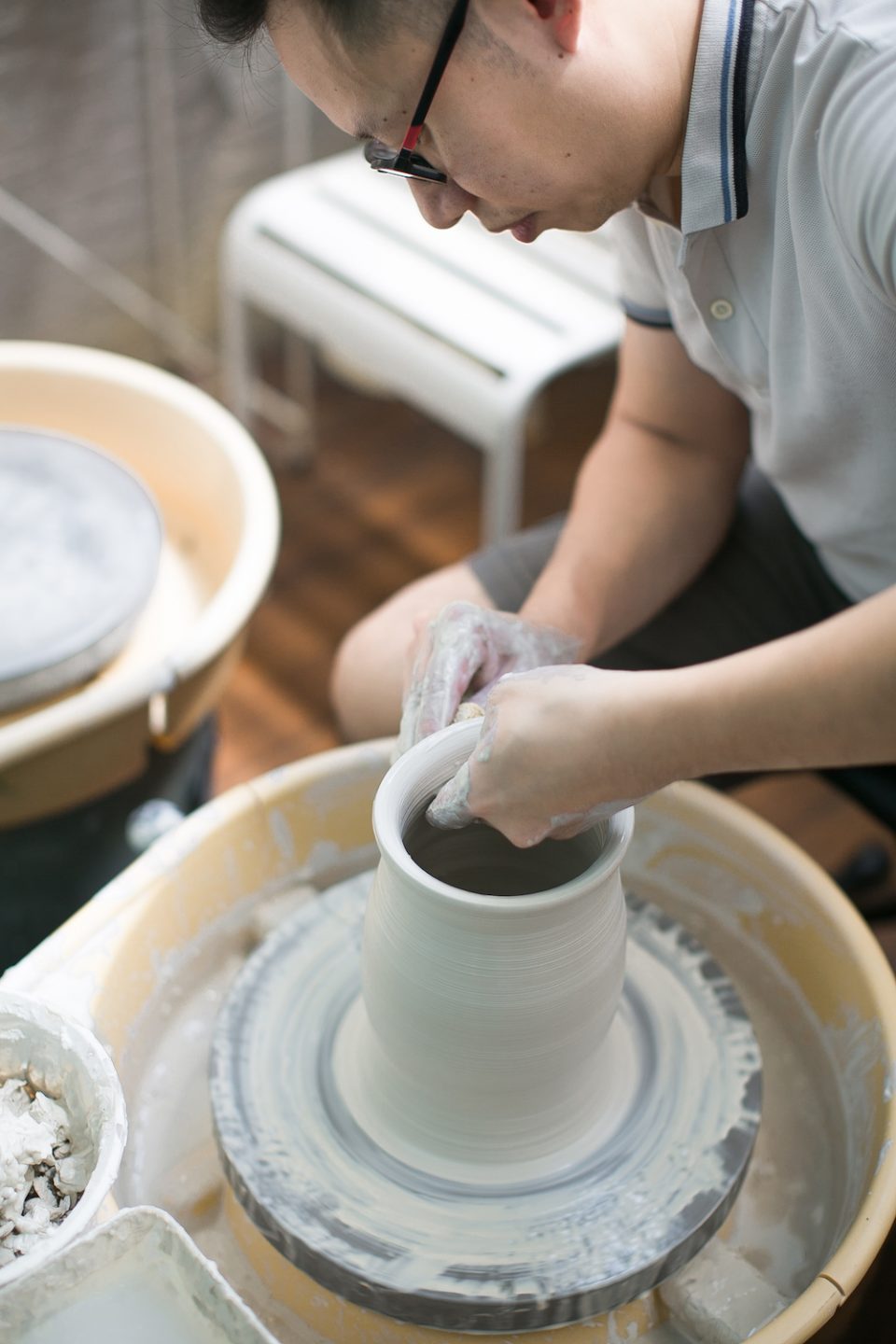
Even though we were once a vessel destined for destruction, the Potter has been pleased to make us into another vessel, one to call His own.
I have been a potter for just five years and I make mistakes on the wheel all the time. Years of practice would surely reduce the mistakes, but even the most skilful potter would at times gaze at a vessel spinning on the wheel, marred by an accidental push or sagging under its own weight, and decide that it is not going to be fired like this. Its damaged part would be trimmed off with a sharp tool and what was on the way to becoming a tall vase might eventually become a large planting pot.
I may have my own ideas of what I ought to be but God is not done with me yet.
Does God, our Potter, make mistakes? In the unfolding dramas of our lives and our societies, it may often appear so. Perhaps we follow God’s leading into a course of study only to feel forced into a totally different line of work. Perhaps we start a thriving business only for it to fail spectacularly because of some external circumstances. Perhaps we find out our spouse is the polar opposite of whom we thought they were when we walked down the aisle.
Couldn’t God, in all His infinite power, guide us smoothly through life? I do wonder about that sometimes. But then I remember that I was once a vessel so marred, so misshapen, destined for destruction, yet my Potter has been pleased to make me into another vessel, one to call His own.
His beloved workmanship
“For we are His workmanship, created in Christ Jesus for good works, which God prepared beforehand so that we would walk in them.” Ephesians 2:10
There is something indescribably pleasurable about handmade pottery, both for the user of the vessel and the potter who makes it. In our rapidly urbanising societies, where human hands spend more time tapping on glass screens or plastic keys than probably any other activity, we are fast becoming strangers to the earth, to one another, even to our own bodies.
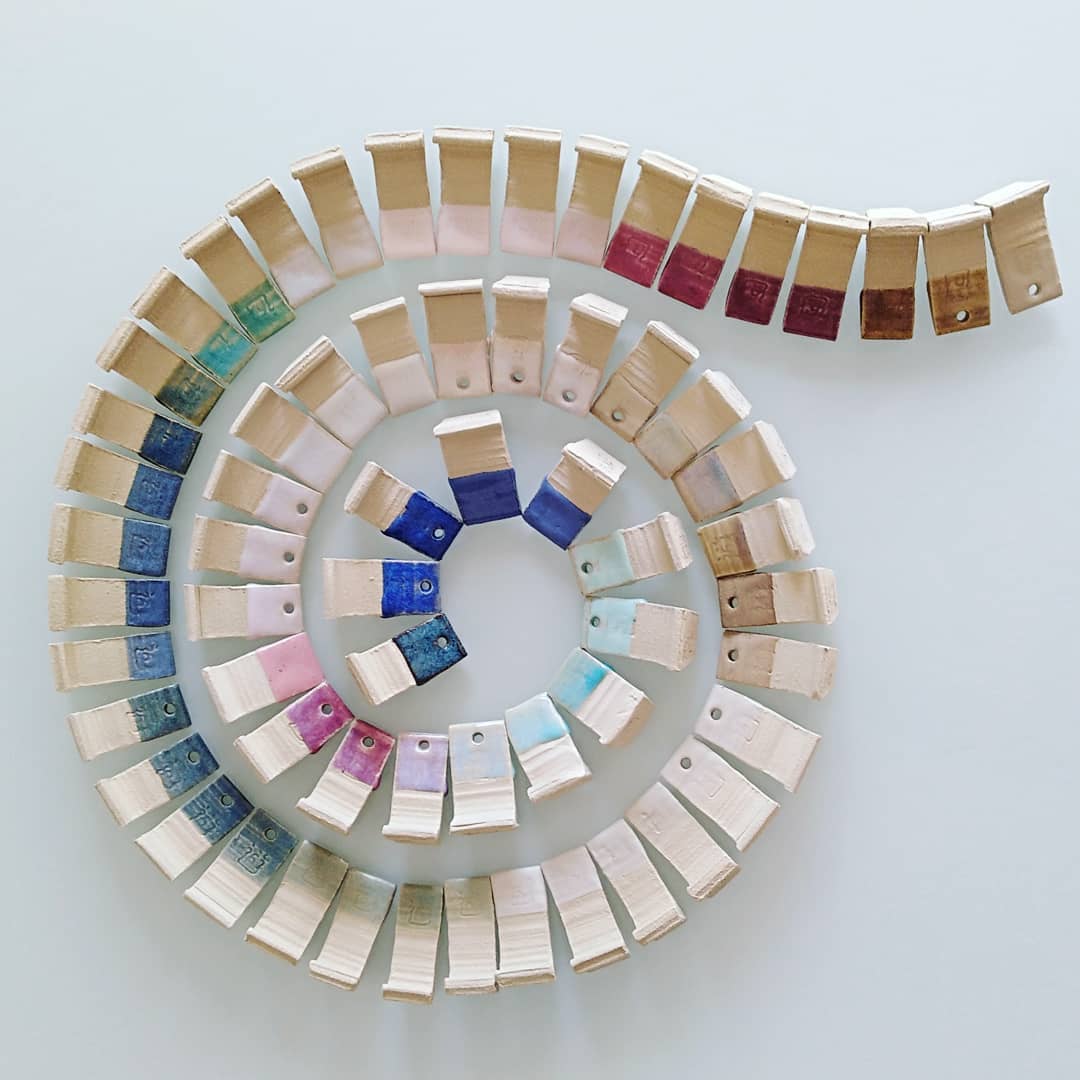
Trying out new glazes that have been self-formulated so that the works bear the mark of the maker from start to finish.
Out of the hundreds of people who experience our pottery workshops, the vast majority have never before touched clay and have not engaged in crafts for years. And so we love to share in their joy of discovery, remembering how our first introduction to pottery gave us the chance to slow down our hearts, touch the earth with our hands, and take stock of our lives while little vessels of beauty slowly emerged before us.
If my life revolves around a wavering centre that fails to hold, it is liable to fall apart in times of trial.
In recent months, we have also moved more and more towards processing our own local clays and formulating our own glazes, so that our works bear the mark of the maker from start to finish. It takes up more time for sure, but we take great satisfaction in being involved with every aspect of the creation process. Could it be that in creating each of us, God similarly takes joy in every aspect of His workmanship? In all our ugliness and beauty? In all our wretchedness and promise? In all our simplicity and complexities?
And dare we live our lives truly embracing the belief that we are indeed God’s beloved workmanship? Dare we journey through each day full of wonder, witnessing His glorious plan for our lives unfolding before our eyes, even as we struggle through trials, sins and disappointments? The longer I journey as a potter, the more I can imagine that we are indeed jars of clay, each possessing a treasure, each fearfully and wonderfully made.
This treasure within
“But we have this treasure in earthen vessels, so that the surpassing greatness of the power will be of God and not from ourselves; we are afflicted in every way, but not crushed; perplexed, but not despairing; persecuted, but not forsaken; struck down, but not destroyed; always carrying about in the body the dying of Jesus, so that the life of Jesus also may be manifested in our body.” 2 Corinthians 4:7-10
Each time we open the kiln, we are filled with both excitement and trepidation because with handmade pottery, one can never really be perfectly sure how the clay and glazes would respond to the intense heat of the kiln.
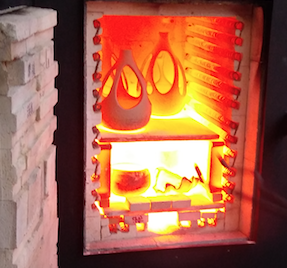
This final firing reminds us that we live in the here-but-not-yet part of the eternal story.
This final step cannot be fully controlled as the fire interacts with the clay and glazes to achieve its final form. And so we are often rewarded with wonderful surprises, accompanied of course by the occasional painful disappointments of damaged works.
Beauty is one thing, but what matters more is what it is able to contain and how it is able to be used.
Yet we are also reminded that no matter how beautiful a clay vessel is, it is ultimately still a clay vessel, made of the dust of the earth. Beauty is one thing, but what matters more is what it is able to contain and how it is able to be used.
This final firing also reminds us that we live in the here-but-not-yet part of the eternal story. We only know in part but not yet in full what God has in store for those who trust and love Him. How wonderful it is, then, that we each hold in our bodily vessels a treasure of immeasurable worth!
Whether we are poor or rich, sickly or healthy, weak or strong, we carry within us the death and life of Christ. And so we are never crushed, never despairing, never forsaken, never destroyed, even if we sometimes feel that way. And may this treasure inside us never be kept hidden away, but always flow out as streams of living water – cleansing dirt, quenching thirst, giving life.
We are an independent, non-profit organisation that relies on the generosity of our readers, such as yourself, to continue serving the kingdom. Every dollar donated goes directly back into our editorial coverage.
Would you consider partnering with us in our kingdom work by supporting us financially, either as a one-off donation, or a recurring pledge?
Support Salt&Light
